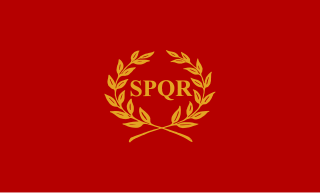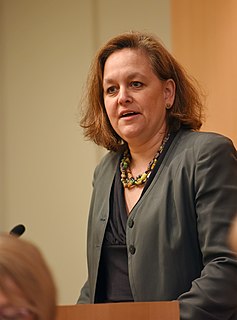A superpower is a state with a dominant position characterized by its extensive ability to exert influence or project power on a global scale. This is done through the combined means of economic, military, technological, political and cultural strength as well as diplomatic and soft power influence. Traditionally, superpowers are preeminent among the great powers. While a great power state is capable of exerting its influence globally, superpowers are states so influential that no significant action can be taken by the global community without first considering the positions of the superpowers on the issue.

Nikolai Alexandrovich Berdyaev was a Russian philosopher, theologian, and Christian existentialist who emphasized the existential spiritual significance of human freedom and the human person. Alternative historical spellings of his surname in English include "Berdiaev" and "Berdiaeff", and of his given name "Nicolas" and "Nicholas".

Nova Roma is an international Roman revivalist and reconstructionist organization created in 1998 by Joseph Bloch and William Bradford, later incorporated in Maine as a non-profit organization with an educational and religious mission. Nova Roma claims to promote "the restoration of classical Roman religion, culture, and virtues" and "shared Roman ideals".

Interfaith dialogue refers to cooperative, constructive, and positive interaction between people of different religious traditions and/or spiritual or humanistic beliefs, at both the individual and institutional levels. It is distinct from syncretism or alternative religion, in that dialogue often involves promoting understanding between different religions or beliefs to increase acceptance of others, rather than to synthesize new beliefs.
Glocalization or Glocalisation is the "simultaneous occurrence of both universalizing and particularizing tendencies in contemporary social, political, and economic systems." The notion of glocalization "represents a challenge to simplistic conceptions of globalization processes as linear expansions of territorial scales. Glocalization indicates that the growing importance of continental and global levels is occurring together with the increasing salience of local and regional levels."

The United Nations Global Compact is a non-binding United Nations pact to encourage businesses and firms worldwide to adopt sustainable and socially responsible policies, and to report on their implementation. The UN Global Compact is a principle-based framework for businesses, stating ten principles in the areas of human rights, labor, the environment and anti-corruption. Under the Global Compact, companies are brought together with UN agencies, labor groups and civil society. Cities can join the Global Compact through the Cities Programme.
The phrase "Think globally, act locally" or "Think global, act local" has been used in various contexts, including planning, environment, education, mathematics, business and the church. For many environmental activists, the phrase has been changed into "act globally, act locally" due to the growing concern for the whole planet and thus the need of activism everywhere in the world.
The following are links to international rankings of the United States.
This article lists historical urban community sizes based on the estimated populations of selected human settlements from 7000 BC – AD 1875, organized by archaeological periods.
The following are international rankings of Japan.

Global Peace Index (GPI) is a report produced by the Institute for Economics & Peace (IEP) which measures the relative position of nations' and regions' peacefulness. The GPI ranks 163 independent states and territories according to their levels of peacefulness. In the past decade, the GPI has presented trends of increased global violence and less peacefulness.
The following are international rankings of Saudi Arabia.
The FIMCAP, which is short for Fédération Internationale des Mouvements Catholiques d’Action Paroissiale, is an umbrella organization for Catholic youth organizations. Its 31 member organizations are based in 28 countries. The FIMCAP was founded in 1962 and is recognised as an official Catholic organization by the Dicastery for Laity, Family and Life. FIMCAP is also a full member of the European Youth Forum.

Anja Mihr is a German political scientist and human rights researcher. Her working areas are in Transitional Justice, Cyber Justice, Climate Justice, Governance and Human Rights Regimes. She is an internationally known academic has taught in various universities in Germany, the United States, Italy, China and the Netherlands. Her main work focuses on human rights, governance and transitional justice, looking at the interlinkage between institutions, organizations and the way human rights realization can be leveraged.

The World Social Forum is an annual meeting of civil society organizations, first held in Brazil, which offers a self-conscious effort to develop an alternative future through the championing of counter-hegemonic globalization.
Habitat III, the United Nations Conference on Housing and Sustainable Urban Development, took place in Quito, Ecuador, from 17 – 20 October 2016.
The Women's International Networking Conference (WINConference) is a women's networking conference. It runs annually in capital cities in Europe. The focus of the conference has been women, female empowerment and leadership. The Guardian has described it as a part of a trend they named "Sisterhood 2.0." It is one of the largest conferences of its kind, according to Financial Express.

Carla Ravi Koppell is an American academic who works as a senior advisor and distinguished fellow with the Edmund A. Walsh School of Foreign Service at Georgetown University, where she leads the University Leadership Council on Diversity and Inclusion in International Affairs. In that role, she works with deans of graduate schools of public policy and international affairs to incorporate attention to diversity and inclusion in their curricula and programs. In July 2020, she was reported to be leading a policy working group on international women's and girls' issues for the Joe Biden 2020 presidential campaign.

Climate change vulnerability is defined as the "propensity or predisposition to be adversely affected" by climate change. It can apply to humans but also to natural systems (ecosystems). Human and ecosystem vulnerability are interdependent. Climate change vulnerability encompasses "a variety of concepts and elements, including sensitivity or susceptibility to harm and lack of capacity to cope and adapt". Vulnerability is a component of climate risk. Vulnerability differs within communities and across societies, regions and countries, and can change over time. Approximately 3.3 to 3.6 billion people live in contexts that are highly vulnerable to climate change in 2021.